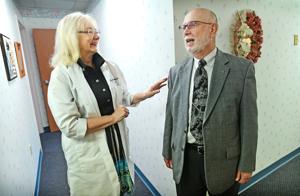
News
October 02, 2025
Breast Cancer Awareness | 'I'm very fortunate': Breast cancer diagnosis surprised local man, doctors
Of the more than 316,000 people diagnosed with breast cancer each year, less than 1% are projected to be male, according to the National Breast Cancer Coalition. That's a small fraction – but Robert "Bob" Wertz, 82, is living proof...
Robert "Bob" Wertz, 82, never imagined he’d be part of the conversation surrounding breast cancer awareness. Like most men, the disease seemed a distant threat, something that primarily affected women. That’s why his diagnosis came as a complete shock, not just to him, but also to his doctors.
"I'm very fortunate," Wertz says, reflecting on his journey since the unexpected news. His story highlights a crucial point: breast cancer doesn't discriminate. While it's significantly rarer in men, it's a reality that needs greater attention and awareness.
According to the National Breast Cancer Coalition, men account for less than 1% of the over 316,000 breast cancer diagnoses projected each year. This small fraction often leads to delayed diagnoses in men, as both patients and healthcare providers may not immediately consider breast cancer as a possibility. This delay can sometimes result in the cancer being detected at a later, more advanced stage, making treatment more challenging.
Wertz's experience underscores the importance of vigilance for everyone, regardless of gender. He encourages men to be aware of their bodies and to promptly report any unusual changes to their doctor. These changes can include lumps, swelling, skin dimpling, nipple discharge, or any pain in the chest area.
While the exact causes of male breast cancer are still being researched, risk factors include a family history of breast cancer (in either men or women), genetic mutations like BRCA1 and BRCA2, exposure to radiation, and conditions that increase estrogen levels.
Wertz’s positive attitude and willingness to share his story are helping to break down the stigma surrounding male breast cancer. By speaking openly about his experience, he hopes to encourage other men to be proactive about their health and to seek medical attention if they notice any concerning symptoms. His journey serves as a powerful reminder that early detection is key, and that breast cancer awareness is a message that applies to everyone. He emphasizes that while rare, male breast cancer is a reality, and being informed can make all the difference.
"I'm very fortunate," Wertz says, reflecting on his journey since the unexpected news. His story highlights a crucial point: breast cancer doesn't discriminate. While it's significantly rarer in men, it's a reality that needs greater attention and awareness.
According to the National Breast Cancer Coalition, men account for less than 1% of the over 316,000 breast cancer diagnoses projected each year. This small fraction often leads to delayed diagnoses in men, as both patients and healthcare providers may not immediately consider breast cancer as a possibility. This delay can sometimes result in the cancer being detected at a later, more advanced stage, making treatment more challenging.
Wertz's experience underscores the importance of vigilance for everyone, regardless of gender. He encourages men to be aware of their bodies and to promptly report any unusual changes to their doctor. These changes can include lumps, swelling, skin dimpling, nipple discharge, or any pain in the chest area.
While the exact causes of male breast cancer are still being researched, risk factors include a family history of breast cancer (in either men or women), genetic mutations like BRCA1 and BRCA2, exposure to radiation, and conditions that increase estrogen levels.
Wertz’s positive attitude and willingness to share his story are helping to break down the stigma surrounding male breast cancer. By speaking openly about his experience, he hopes to encourage other men to be proactive about their health and to seek medical attention if they notice any concerning symptoms. His journey serves as a powerful reminder that early detection is key, and that breast cancer awareness is a message that applies to everyone. He emphasizes that while rare, male breast cancer is a reality, and being informed can make all the difference.
Category:
Politics